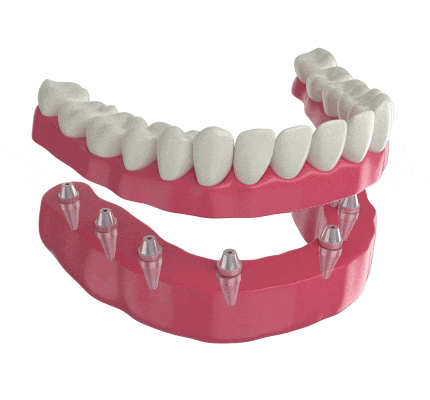Implant Supported Dentures
Implant-supported dentures offer a revolutionary advance in restorative dentistry, combining the stability of dental implants with the full coverage of traditional dentures for an unmatched blend of functionality, aesthetics, and comfort. Unlike conventional dentures that can slip and cause discomfort, these are securely anchored into the jawbone with titanium implants, known for their durability and compatibility, ensuring a fit that feels like natural teeth. This solution not only addresses the major drawbacks of traditional dentures by providing a stable, secure fit that allows for confident eating and speaking but is also more affordable and accessible compared to individual dental implants. Denture implants are specially designed for maximum stability, making the best dental implants essential for success. ActOn specializes in dental implants in St. Louis and offers the accessibility of advanced, affordable dentures and implants. Implant-supported dentures bridge the gap between dentures vs. implants, offering a practical, cost-effective solution for extensive tooth loss, preserving jawbone integrity, and improving quality of life. This innovative approach signifies a major advancement in dental prosthetics, providing a long-term, aesthetically pleasing solution for those looking to restore their smile and confidence.

Affordable Dental Implants
SUPERIOR QUALITY
ActOn Implants uses only the highest quality dental implants.

HIGH PATIENT SATISFACTION RATES
Our commitment to excellence is reflected in our high patient satisfaction and positive outcomes.
VALUE-PRICED IMPLANTS
ActOn quality implants at value prices, ensuring accessibility for all patients.

MOST ADVANCED
Get back the best smile of your life, with ActOn Implants.
Ready to Get Started? Have Questions?
Call us. We love helping.
Dental Implants are More than a Cosmetic Solution
For those who are missing the majority of their teeth or have several rotten teeth, leaving those teeth in your mouth is a major risk. If the tooth is painful and beginning to rot it is almost certainly infection. An infection in your teeth can spread to your heart, your lungs, and your brain. They are all closely connected. Those teeth need to be removed before they spread an infection to a vital area of your body.
What is a Full Mouth Replacement?
Full mouth replacements are similar to arch replacements. In this case, implant-secured dentures are installed on both the upper and lower jaw.
There was a time when this kind of procedure could not be performed in cases where gum disease had advanced into the jaw. If the jaw was extensively damaged, then the fear was that drilling into the jaw would cause even more damage or that the implants would not be able to fit securely into the jaw.
However, Dr. Slaven’s research concerning bone growth allows patients to have dental implants installed even when there is significant damage to the jawbone. Indeed, there are very few cases today in which a patient would not be a candidate for dental implants.
Full mouth replacements function in a very similar way to single-tooth dental implants. In this case, a bridge is fitted to the gum line and the dentures are installed on the bridge. Unlike other forms of dentures, they will not come loose or move around in your mouth. Once installed, they will be installed forever—a permanent solution to a permanent problem.
How are Full Mouth Replacements Installed?
A full mouth replacement is a set of two arches. Each arch is installed individually into the jawbone. While each case will be different depending on an individual patient’s unique needs, there are some similarities to every case.
For instance, each case will begin with a thorough evaluation. Since gum disease can cause damage to the jawbone itself, Dr. Slaven will need to assess how much damage there is to the jawbone. This process will require a set of x-rays. At that point, Dr. Slaven will recommend treatment to regrow some of the bone if there is significant damage. This will ensure that the abutments have a solid foundation on which to install the implant-supported dentures.
The process of installing the implants is identical to installing individual dental implants. This is the next step in the process. In this case of a full mouth replacement, a set of implants will be installed through the gum line and into the jawbone. Temporary teeth will be installed while the abutments fuse to the jawbone. This can take 4 to 6 months.
Once the abutments have fused to the jawbone, the bridge will be installed in the place of the implants. In some cases, this may take multiple visits. Once done, however, you will have a full new set of teeth on both your upper and lower jaw!
Testimonials
Real dental implant experiences from actual ActOn Implants patients.
Are Implant Secured Dentures Right For Me?
As an option, implant secured dentures are the most aggressive way of treating tooth loss. This includes removing teeth that may be showing significant signs of decay. In the end, the method involves installing an entirely new set of teeth. This can include both upper and lower teeth. There are less aggressive treatments available. For instance, if most of your teeth are still okay, you may be interested in only installing a few dental implants.
Determining whether a full arch replacement is the best solution will depend on the number and level of decay of your current teeth. It’s something you should definitely consider if the majority of your teeth are showing signs of decay.
Some folks may shy away from surgery. That’s okay, but non-surgical procedures produce poorer results. These procedures such as traditional dentures and veneers are meant more for cosmetic purposes than they are utilitarian ones. In other words, it’s still going to be difficult to chew and the risk of your dentures coming loose remains a factor. That is not the case with implant secured dentures which are a permanent solution to a permanent problem.
What Is A Full Mouth Replacement?
Full mouth replacements are similar to arch replacements. In this case, implant-secured dentures are installed on both the upper and lower jaw.
There was a time when this kind of procedure could not be performed in cases where gum disease had advanced into the jaw. If the jaw was extensively damaged, then the fear was that drilling into the jaw would cause even more damage or that the implants would not be able to fit securely into the jaw.
However, Dr. Slaven’s research concerning bone growth allows patients to have dental implants installed even when there is significant damage to the jawbone. Indeed, there are very few cases today in which a patient would not be a candidate for dental implants.
Full mouth replacements function in a very similar way to single-tooth dental implants. In this case, a bridge is fitted to the gum line and the dentures are installed on the bridge. Unlike other forms of dentures, they will not come loose or move around in your mouth. Once installed, they will be installed forever—a permanent solution to a permanent problem.






